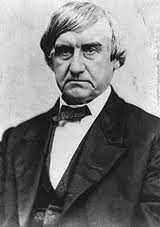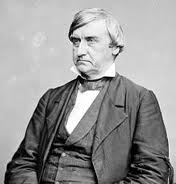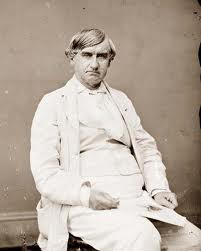 Lincoln’s JAG, was not only a Kentucky Radical Republican, but became one of President Lincoln’s staunchest supporters. Joseph Holt was appointed Judge Advocate General of the Army, by Lincoln in 1862 and became the first JAG to hold the rank of General. Holt was a close personal friend of Lincoln ally and advisor Joshua Speed and both were natives of Kentucky. A savvy lawyer and politician, Joseph Holt was a no-nonsense civil servant that could handle the tremendous legal tasks that inundated Lincoln’s White House during the Civil War.
Lincoln’s JAG, was not only a Kentucky Radical Republican, but became one of President Lincoln’s staunchest supporters. Joseph Holt was appointed Judge Advocate General of the Army, by Lincoln in 1862 and became the first JAG to hold the rank of General. Holt was a close personal friend of Lincoln ally and advisor Joshua Speed and both were natives of Kentucky. A savvy lawyer and politician, Joseph Holt was a no-nonsense civil servant that could handle the tremendous legal tasks that inundated Lincoln’s White House during the Civil War.
Joseph Holt was born, January 6, 1807, a native of Stephensport, Kentucky. He attended Saint Joseph’s College and Centre College and started practicing law in Elizabethtown, Kentucky. He married his first wife, Mary Harrison in 1832 and the couple moved to Louisville. From 1833 to 1835, Holt was an editor for the Louisville Advertiser and was the Commonwealth’s Attorney. Joseph Holt and his wife moved to Mississippi where he practiced law in Port Gibson, Natchez, and Vicksburg. While living in the river cities he and his wife were infected with tuberculosis and Mary died, Joseph returned to Kentucky in order to recover. Holt would marry again in 1850, to Margaret Wickliffe, who was 15 years his junior. Margaret unexpectedly died in 1860.
Originally a member of the Democratic Party, who later became a Radical Republican, Holt campaigned for James Buchanan in 1856. In 1859 President Buchanan appointed Holt, Patent-Office Commissioner, 1857-59, Postmaster General, 1859-60 and Secretary of War, December 31, 1860-March 4, 1861, but lost office with the election of Abraham Lincoln later that year. With the end of the Buchanan administration, Holt returned to Kentucky and cooperated with Lincoln friend Joshua Speed to keep Kentucky in the Union. Holt was determined to hold Kentucky in the Union. Joseph Holt, now an independent citizen volunteering on the nation’s behalf, launched a personal campaign to ensure his home state’s loyalty. With the beginning of the Civil War, Holt became a strong supporter of the Union cause. He told fellow Democrats in Kentucky that disunion would mean “national weakness, standing armies and incessant wars and expensive frontier fortifications.”
 Holt’s efforts were genuinely appreciated by the President, whose close Kentucky friend Speed, wrote Holt in December 1861, that President Lincoln wanted to appoint him to a post “in some form commensurate with the service you have rendered the country.” Speed himself promoted Holt for Secretary of War, arguing “You could render great service to the nation in that position.” Holt seems to have been quite content with Lincoln’s decision, it may have been he who recommended Stanton for the War Department slot in the first place, as Stanton had recommended him for the post back in late December 1860.
Holt’s efforts were genuinely appreciated by the President, whose close Kentucky friend Speed, wrote Holt in December 1861, that President Lincoln wanted to appoint him to a post “in some form commensurate with the service you have rendered the country.” Speed himself promoted Holt for Secretary of War, arguing “You could render great service to the nation in that position.” Holt seems to have been quite content with Lincoln’s decision, it may have been he who recommended Stanton for the War Department slot in the first place, as Stanton had recommended him for the post back in late December 1860.
Grateful for his support of the Union cause and truly hoping that someone would accept the position, Lincoln appointed Holt Judge Advocate General for the War Department in September 1862. This post gave him the authority to use military courts against all persons, including civilians, accused of impairing the war effort. On July 17, 1862, the U.S. Congress had substantially expanded the size and purview of the judge advocate general’s office, assigning to its head the rank, pay, and allowance of a colonel of cavalry and authorizing him to appoint a team of assistant judge advocates, each of whom served with the rank and pay of a major. The tasks assigned to the office also multiplied. The tasks included receiving, revising, and recording the proceedings of all courts-martial, courts of inquiry, and military commissions conducted by the army; providing reports to the secretary of war in connection with those cases that required the action of the president; dealing with applications for clemency received either by the president or the secretary of war; overseeing in many cases and preparing the charges against persons being brought to trial; rendering opinions on any and all questions of military law as requested by the president, the secretary of war, or the commanding general of the army; and assisting in the review of cases brought for appeal. The judge advocate general of the army became the primary adjudicator of military law in much the same way that the attorney general was the primary arbiter of the law in the civil realm. Judge Advocate General Joseph Holt was just the taskmaster and dedicated civil servant for such a monumental undertaking. Lincoln recognized Holt’s diligence and unswerving dedication by promoting him to the rank of Brigadier-General, in 1864.
When Holt took office, he was inundated with the work of organizing, conducting, and reviewing the results of the seemingly endless stream of legal cases that came under his authority, many of which demanded careful analysis, thorough reconsideration and review, and the production of additional and often lengthy written reports. Holt’s duties required him to consult directly and on a regular basis with President Lincoln, whose opinion and decision-making power were frequently essential components of the process, especially in cases where a defendant faced dismissal from the army or execution. Investigation into the court-martial files of the judge advocate general’s office during this period indicates that Lincoln, Holt, and the president’s secretary, John G. Nicolay, typically met in the morning. On some occasions, the trio considered more than seventy cases in a single sitting; at least once, they spent six straight hours in consultation.
For each case that he brought to Lincoln’s attention, Holt summarized the charges, the evidence, the sentence, the opinion presented by previous reviewers, and his own recommendations. When Holt and the president disagreed on how to handle a particular case, it was typically Holt who took the harder line, though his often extended written opinions also reveal him to be capable of demonstrating “compassionate good sense.”
The president frequently looked for mitigating circumstances that might justify commuting the sentence. Holt remembered: “I used to try and argue the necessity of confirming and executing these sentences. I said to him, if you punish desertion and misbehavior by death, these men will feel that they are placed between two dangers and of the two they will choose the least. They will say to themselves, there is the battle in front where they may be killed, it is true, but from which they also have a good chance to escape alive; while they will know that if they fly to the rear their cowardice will be punished by certain death.”
In 1863 Holt led the prosecution of Clement Vallandigham, the leader of the Peace Democrats or Copperheads.Vallandigham was arrested in May, 1863 and accused of treason. Found guilty by a military commission, he was sentenced to imprisonment, however Lincoln intervened and commuted his sentence banishing him behind Confederate lines. In 1864, Judge Advocate General Holt was asked by Secretary of War Stanton to investigate disloyalty in the North and in his report Holt suggested that secret organizations such as the Order of American Knights and the Sons of Liberty were aiding Confederate forces.
In 1864, the Republican Party was searching for a War Democrat to nominate for Vice President. Joseph Holt of Kentucky was a natural selection of some, but Andrew Johnson, the war governor of Tennessee, was nominated instead.
 When President Lincoln was assassinated in April, 1865, Holt joined Secretary of War Stanton and Attorney General Speed, in calling for the conspirators to be tried by a military commission. The new president, Andrew Johnson, agreed and ordered the formation of a nine-man military commission. Holt was convinced that Confederate leaders, including Jefferson Davis himself, had masterminded the plot and wanted the conspirators to answer for their crime.
When President Lincoln was assassinated in April, 1865, Holt joined Secretary of War Stanton and Attorney General Speed, in calling for the conspirators to be tried by a military commission. The new president, Andrew Johnson, agreed and ordered the formation of a nine-man military commission. Holt was convinced that Confederate leaders, including Jefferson Davis himself, had masterminded the plot and wanted the conspirators to answer for their crime.
The trial, with Holt, the government’s chief prosecutor began on 10th May, 1865. Joseph Holt had two assistant judge advocates, John Bingham and General Burnett. The military commission included leading generals, Hunter, Foster, Kautz, Lew Wallace, Harris and Howe. Holt attempted to obscure the fact that there were two plots: the first to kidnap and the second to assassinate. It was important for the prosecution not to reveal the existence of a diary taken from the body of John Wilkes Booth. The diary made it clear that the assassination plan dated from April 14,1865. The defence surprisingly did not call for Booth’s diary to be produced in court. Holt was accused of withholding evidence, but it was never proven.
On June 29, 1865, all 8 conspirators were found guilty in the death of President Abraham Lincoln. Four were sentenced to hang and the other 4 defendants received prison terms. On July 7, 1865, Mary Surratt, Paine, Atzerodt and Herold were hung at Washington Penitentiary. Surratt, who was expected to be reprieved, was the first woman in American history to be executed. The Military Commission had recommended that Mrs. Surratt be shown mercy “due to her sex and age”. President Johnson was later to say he was never told this and he gave the order to hang the woman who “kept the nest that hatched the egg”. Johnson’s charge that Holt had withheld the petition from him stuck to Holt; he spent the rest of his life attempting to vindicate himself of the charge and some contemporaries stated that it ruined him politically.
Holt published a pamphlet titled Vindication of Judge Advocate General Holt From the Foul Slanders of Traitors, Confessed Perjurers and Suborners, Acting in the Interest of Jefferson Davis, a failed effort to explain his version of the trial and distance himself from President Andrew Johnson.
 Joseph Holt retired as Judge Advocate General on December 1, 1875 and unusual among Southern whites, Holt labored in the postwar years to assure that former slaves enjoyed equal citizen rights. That elusive goal ran into a wall of relentless white Southern hostility, “barbarism,” in his eyes, coupled with a Northern indifference. Holt spent the remainder of his life in peaceful retirement. He died on August 1, 1894, in Washington D.C. and is buried in the Holt Family Cemetery in Stephensport, Kentucky.
Joseph Holt retired as Judge Advocate General on December 1, 1875 and unusual among Southern whites, Holt labored in the postwar years to assure that former slaves enjoyed equal citizen rights. That elusive goal ran into a wall of relentless white Southern hostility, “barbarism,” in his eyes, coupled with a Northern indifference. Holt spent the remainder of his life in peaceful retirement. He died on August 1, 1894, in Washington D.C. and is buried in the Holt Family Cemetery in Stephensport, Kentucky.
Joseph Holt, Lincoln’s JAG and Kentucky Radical Republican, was the right man, at the right moment in history, to serve President Lincoln and his country, above and beyond his own self interests.
Bummer

